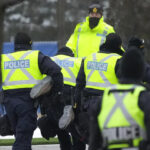
(Updates with Scholz remarks)
By Andreas Rinke and Sarah Marsh
BERLIN, Feb 13 (Reuters) – German Chancellor Olaf Scholz on Sunday warned Russia of immediate sanctions and “hard reactions” if it attacks Ukraine, maintaining a tough tone ahead of a meeting this week with Russian President Vladimir Putin.
Scholz travels to Kyiv on Monday to meet Ukrainian President Volodymyr Zelenskiy and to Moscow on Tuesday to meet Putin as part of diplomatic efforts to ease tensions.
Both trips will be to sound out how to secure peace, which faces a “very, very serious threat,” Scholz said, calling on Russia to de-escalate.
“Military agreession against Ukraine that endangers its territorial integrity and sovereignty will result in hard reactions and sanctions that we have carefully prepared and that we can put into effect immediately, together with our allies in Europe and NATO,” Scholz said in brief remarks to reporters.
The United States has said the Russian military, which has more than 100,000 troops massed near Ukraine, could invade at any moment. Russia denies having any such plans and says its actions are a response to aggression by NATO countries.
Berlin does not expect concrete results from the discussions, a government source said on Sunday.
“The chancellor will make clear that any attack on Ukraine will have heavy consequences … and that one should not underestimate the unity between the European Union, United States and Britain,” the German government source said.
Scholz would tell Putin the troop build-up could “only be interpreted as a threat”, the source told a briefing with journalists, adding: “I do not expect concrete results but these direct talks are important.”
Putin, jostling for influence in post-Cold War Europe, wants security guarantees from Biden to block Kyiv’s entry into NATO and regarding missile deployments near Russia’s borders.
A moratorium on any Ukrainian accession to NATO was not part of Scholz’s “tool kit”, the source said, adding that “what happens on the ground” would determine whether Russia was de-escalating.
“The current situation is per se already a destabilising situation that can get out of control,” the source said.
The source said Scholz hoped to discuss with Zelenskiy and Putin ways to make progress on implementing the Minsk peace accords that seek to end a separatist conflict in east Ukraine.
“It is not the first time that one has talked about these things with Putin, nor will it be the last,” the source said.
(Reporting by Andreas Rinke and Sarah Marsh; additional reporting by Tom Sims; editing by Edmund Blair and Angus MacSwan)




